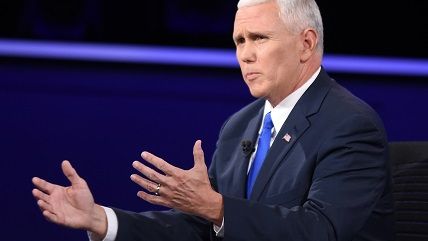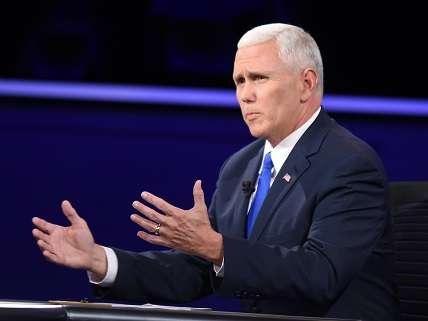Free Trade Not Discussed at Veep Debate, Not Getting Much Needed Positive Play in 2016
Big league miss


There have been many troubling trends in the 2016 election, not least of which has been the shift to decidedly anti-free trade rhetoric from both major party presidential nominees.
The topic, unfortunately, was not brought up by CBS' Elaine Quijano, the moderator, and only came up twice in passing, brought up by Republican vice presidential nominee Mike Pence, who had a relatively pro-free trade record while serving in Congress from 2001 to 2012.
In response to a question on the growing national debt and balancing budgets in his state, Pence eventually explained that his and Donald Trump's economic plan would fix the problem. That plan included cutting taxes, "ending the war on coal," repealing Obamacare and "all of the executive orders that Barack Obama has signed that are stifling economic growth in this economy" and, finally "the kind of trade deals that'll put the American worker first."
Toward the end of the debate, Pence was asked how he would "unify the country." He launched into an attack on how the Obama administration and Hillary Clinton had "weakened America's place in the world" that included a complaint about "the kind of trade deals that have put American workers in the back seat."
That comment, buried in a longer answer, ought to have yielded a follow up. It's hard to figure out which trade deal exactly Pence was referring to. In his 12 years in Congress, he voted in favor of no less than 10 various trade deals with other countries—Singapore, Chile, Australia, Morocco, Oman, Vietnam, Peru, and Colombia, as well as voting in favor of the failed Central American Free Trade Agreement.
For his part, Democratic vice presidential nominee did not bring up trade once, and was not asked about it. Kaine, who has served in the Senate since 2012, has a much shorter and inconclusive voting record on free trade. He voted for a trade preferences extension bill and for trade promotion authority in 2015, and for sugar subsidies reform in 2013. He also voted for an anti-free trade "Buy American" expansion in 2013 as well as in favor of the Export-Import Bank. Pence consistently voted against Ex-Im while in Congress.
Absent the inclusion of Gary Johnson in the final two presidential debates, Mike Pence was the last candidate on a debate stage who might have been forced to give some kind of defense of free trade, which has been a great force for prosperity in the last half century.


Show Comments (187)